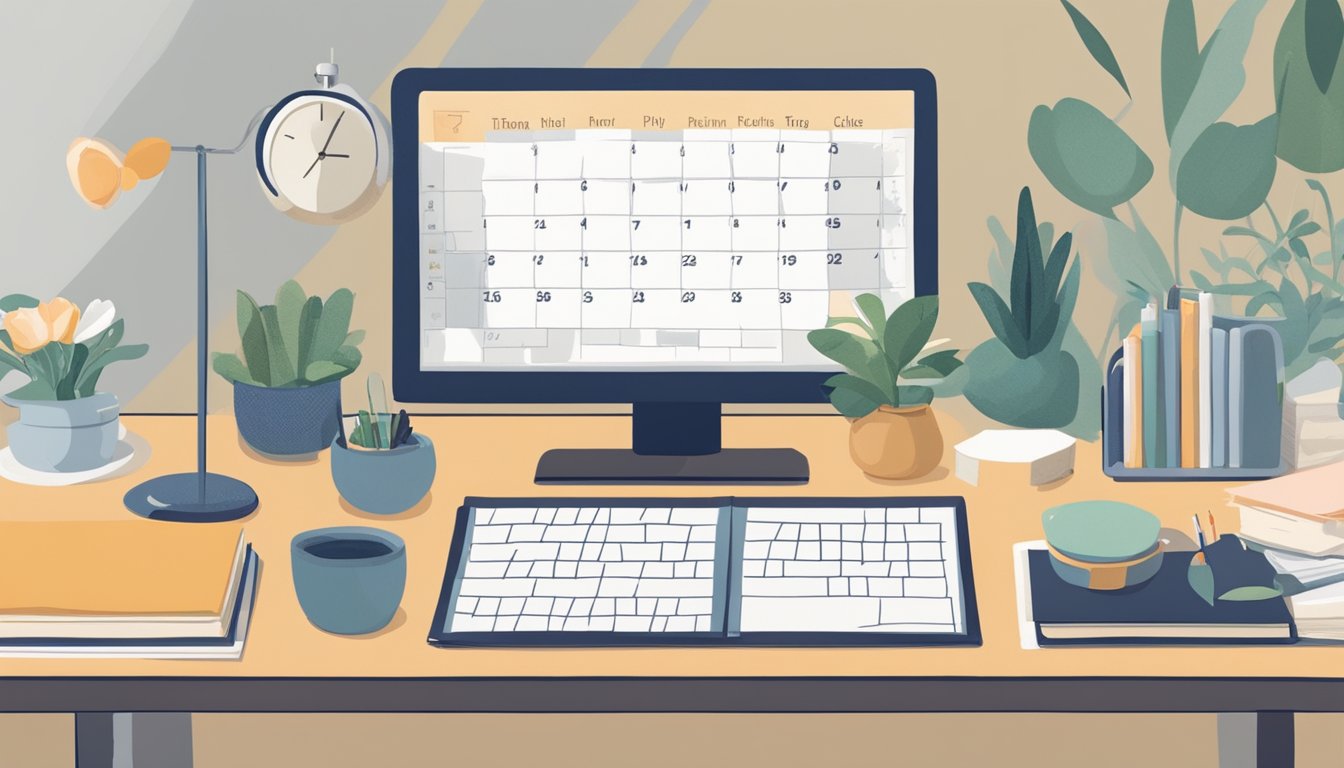Taking care of yourself isn’t a luxury – it’s essential for your health and happiness. When life gets busy, self-care often falls to the bottom of your to-do list, leaving you feeling drained and overwhelmed.
Creating a consistent self-care routine helps you stay healthy, reduces stress, and gives you the energy to tackle life’s challenges. By setting aside time each day for activities that nourish your mind and body, you can prevent burnout and boost your mental well-being. These simple yet effective self-care practices can fit into your daily schedule without requiring major lifestyle changes.
1. Practice daily mindfulness meditation

Take 10 minutes each morning to sit quietly and focus on your breath. Find a comfortable spot where you won’t be disturbed, and set a timer on your phone.
Start by closing your eyes and taking deep breaths. Notice how your chest rises and falls with each breath. When your mind wanders, gently bring your attention back to your breathing.
You can use guided meditation apps if you’re new to the practice. Many free apps offer simple instructions and calming background sounds to help you stay focused.
Try to meditate at the same time each day to build a consistent habit. Morning meditation can help you feel more centered and calm before starting your daily activities.
Pay attention to physical sensations like the feeling of air flowing through your nose or the weight of your body against the chair. This helps train your mind to stay present in the moment.
2. Set boundaries to protect personal time

Setting clear boundaries helps you take control of your time and energy. You need to learn to say “no” to requests that drain your resources or add stress to your life.
Start by identifying activities and relationships that leave you feeling exhausted. Create limits around these situations to protect your mental well-being.
Be direct when communicating your boundaries to others. Let them know when you are not available and stick to those limits, even if it feels uncomfortable at first.
Block specific times in your schedule for self-care activities. Treat these appointments with the same importance as work meetings or doctor visits.
Turn off notifications during your personal time. This simple action prevents interruptions and helps you focus on recharging your energy.
Practice saying “I’ll check my schedule and get back to you” instead of immediately agreeing to requests. This gives you time to consider if the activity aligns with your needs.
3. Take a digital detox regularly
A digital detox helps you break free from constant screen time and find peace away from notifications, emails, and social media. You can start small by setting aside 30 minutes each day without your phone or devices.
Try leaving your phone in another room during meals or workouts. This simple change lets you focus fully on eating or exercising without digital distractions.
Set boundaries by turning off non-essential notifications and keeping devices out of your bedroom. This can improve your sleep quality and reduce anxiety from constant connectivity.
Pick one day each week for a longer break from screens. Use this time to read paper books, go outside, practice hobbies, or connect with friends and family in person.
Create phone-free zones in your home where devices aren’t allowed. The dining room and living room are good places to start. This helps make unplugging a natural part of your daily routine.
4. Incorporate gentle yoga into your routine

You can add simple yoga moves to your day without spending hours on the mat. Even 5-10 minutes of gentle stretching and breathing can make a big difference in how you feel.
Start with basic poses like child’s pose, cat-cow stretches, or gentle twists. These help release tension and increase flexibility without putting strain on your body.
Pick a consistent time that works for you – maybe right after waking up or before bed. Having a set schedule makes it easier to stick with the practice.
Focus on your breath while moving through the poses. Deep breathing helps calm your mind and reduces stress.
If you’re new to yoga, try following along with beginner-friendly videos or take a gentle class. Learning proper form will help you get the most benefits from your practice.
5. Keep a gratitude journal
A gratitude journal helps you notice the good things in your daily life. Writing down what you’re thankful for can boost your mood and lower stress levels.
Start by writing three things you appreciate each day. These can be simple moments like a warm cup of coffee or bigger events like time with friends.
Set aside 5-10 minutes each morning or evening to write in your journal. Pick a time that fits naturally into your routine to make it a steady habit.
Use prompts when you need inspiration. You can write about people who helped you today, small wins you achieved, or moments that made you smile.
The practice works best when you’re specific. Instead of “I’m grateful for my friend,” try “I’m grateful my friend listened to me during lunch today.”
Keep your entries short and simple. Focus on writing honestly about things that truly matter to you.
6. Schedule dedicated relaxation time

Setting aside specific times for relaxation helps you recharge and maintain good mental health. Pick a regular time slot each day that works best with your schedule.
You can use this time for activities that help you unwind. Taking a warm bath, reading a book, or practicing deep breathing exercises are good options to consider.
Make your relaxation time a priority by marking it in your calendar. Treat it like any other important appointment you wouldn’t miss.
Start with 15-30 minutes each day. If mornings work better, try waking up earlier. If evenings suit you, set aside time before bed.
Turn off your phone notifications during this time. Creating a quiet space without distractions allows you to focus fully on relaxing.
Choose activities that truly help you feel calm and refreshed. What works for others might not work for you, so try different options until you find what fits best.
7. Engage in creative expression, like painting or writing

Creative activities can be a powerful way to care for yourself. Pick up a paintbrush, grab a journal, or try any form of art that interests you.
You don’t need special skills or training to benefit from creative expression. The simple act of creating something helps reduce stress and lets you process your emotions.
Try setting aside 15 minutes each day for creative time. You might write in a journal, sketch in a notebook, or work with clay – whatever feels natural to you.
Keep your creative supplies easily accessible. Having art materials or a writing journal nearby makes it more likely you’ll engage in these activities when you need them.
Remember that the goal isn’t to create masterpieces. Focus on enjoying the process rather than judging the results. Your creative time is about self-expression and relaxation.
8. Prioritize getting 7-9 hours of sleep

Sleep plays a key role in your physical and mental health. Getting enough quality sleep helps your body repair itself and keeps your mind sharp.
Set a regular bedtime and wake-up time, even on weekends. This helps train your body’s natural sleep-wake cycle and makes it easier to fall asleep.
Create a peaceful bedroom environment. Keep your room dark, quiet, and cool. Remove electronics and other distractions that might keep you awake.
Many adults don’t get enough sleep each night. Make sleep a top priority by planning your day around getting those important 7-9 hours. Your daily tasks can wait until morning.
Watch what you eat and drink before bed. Avoid caffeine late in the day and skip large meals close to bedtime. These can interfere with your ability to fall asleep.
9. Indulge in a favorite hobby
Taking time for hobbies brings joy and relaxation to your life. Hobbies give you a chance to focus on activities you truly enjoy without pressure or expectations.
You can pick up a paintbrush, read a book, work in your garden, or create something with your hands. The specific activity matters less than choosing something that makes you happy.
Set aside dedicated time each week for your hobby. Even 30 minutes can help you recharge and feel more balanced.
Your hobby doesn’t need to be productive or serve any purpose beyond making you feel good. It’s perfectly fine to spend time on activities just because you enjoy them.
Try different hobbies until you find ones that spark excitement. You might discover new interests that become an important part of your self-care routine.
10. Create a nourishing morning routine
Your morning routine shapes your entire day. Starting with positive habits can boost your mood and energy levels right from the start.
Begin by waking up at the same time each day. This helps regulate your body’s natural sleep cycle and makes it easier to get out of bed.
Take 5-10 minutes to stretch or do light exercises. Moving your body helps wake up your muscles and increases blood flow.
Feed your mind through reading or journaling. Even 10 minutes of these activities can give you mental clarity and emotional balance.
Make time for a healthy breakfast. Choose foods that give you steady energy, like oatmeal, eggs, or yogurt with fruit.
Keep your phone away for the first 30 minutes after waking up. This helps you focus on yourself instead of getting distracted by notifications.
Pick 2-3 of these activities that work best for you. A consistent routine doesn’t need to be complicated to be effective.
11. Experiment with healthy recipes

Trying new healthy recipes adds excitement to your self-care routine while nourishing your body. Pick one new recipe to test each week and make it an enjoyable cooking adventure.
Start with simple recipes that use whole ingredients like fresh vegetables, lean proteins, and whole grains. Keep a collection of your favorite successful recipes to build your personal cookbook.
Make cooking more fun by playing music or inviting a friend to join you. Shop for fresh ingredients at local farmers markets or try growing some herbs at home to add to your dishes.
Pay attention to how different foods make you feel after eating them. Notice which meals give you the most energy and satisfaction. This helps you develop eating habits that truly support your wellbeing.
Set aside time on weekends to plan your recipes for the week. Having a plan makes it easier to stick with healthy cooking instead of reaching for takeout or processed foods.
12. Spend time in nature
Nature offers a simple way to recharge and reset your mind. You can start by taking a short walk in a local park or spending time in your backyard.
Try sitting quietly outdoors for 15-30 minutes each day. Watch the clouds, listen to birds, or feel the breeze on your skin.
Starting a small garden can connect you with nature daily. You can grow herbs on a windowsill or plant flowers in containers on your porch.
Walking on nature trails or visiting green spaces helps reduce stress. Even looking at trees through a window or bringing plants inside your home can improve your mood.
Beach visits, forest walks, or mountain hikes give you fresh air and natural vitamin D from sunlight. These activities can become regular parts of your self-care routine.
Final Thoughts
Self-care looks different for each person. What works well for your friend might not work for you. The key is finding routines that fit your lifestyle and needs.
Start small with 1-2 practices that feel manageable. You can always add more activities as these become natural habits. Remember that self-care isn’t selfish – it’s essential for your wellbeing.
Track what makes you feel refreshed and energized. Keep a simple note on your phone or journal about which routines give you the most benefit. This helps you focus on activities that truly serve you.
Making time for self-care might feel challenging at first. Be patient with yourself as you build these new habits. Even 5-10 minutes of dedicated self-care can make a positive difference in your day.
Quick Tips:
- Schedule self-care like any other important appointment
- Adjust routines when they’re not serving you anymore
- Celebrate small wins as you build healthy habits
- Keep your practices simple and sustainable
Your self-care journey is personal and will evolve over time. Trust yourself to know what you need, and make adjustments as your life changes.












No responses yet